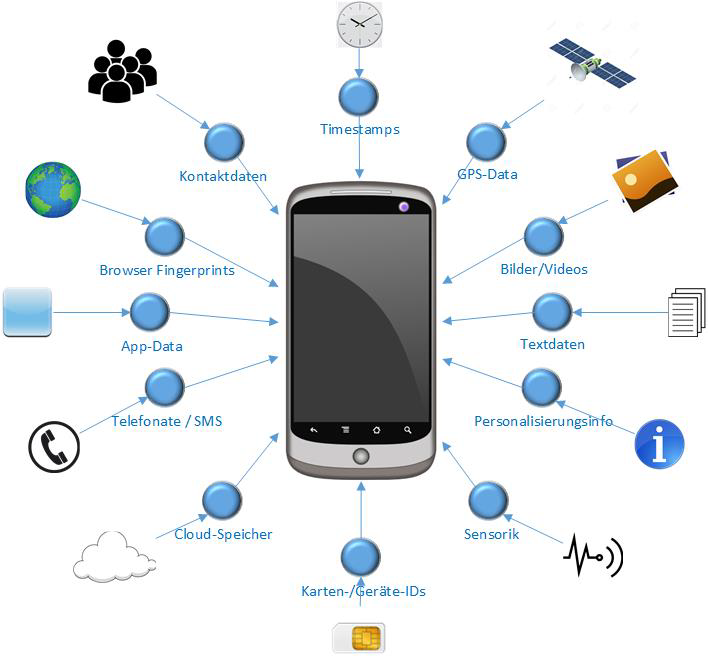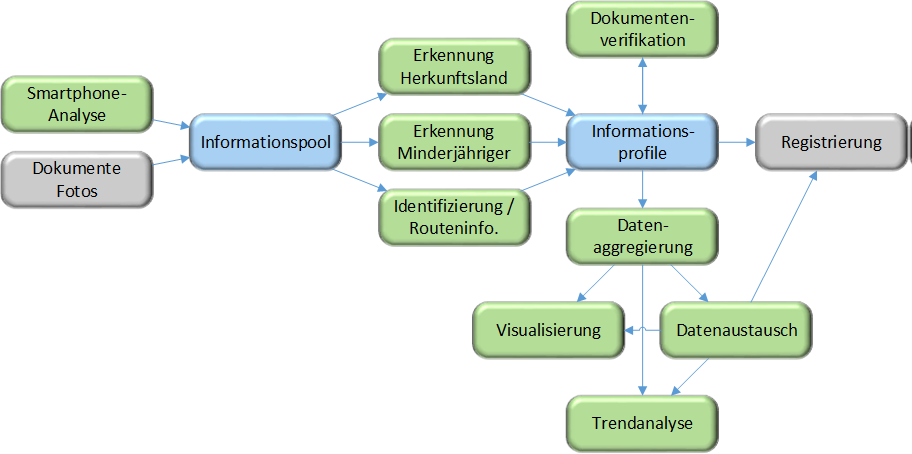Confident Identification by Using Mobile Remote Devices
SmartIdentification is a bilateral KIRAS project (Austria/ Germany) on the use of existing data on smartphones to analyze trends in trafficking routes and to identify individuals.

Project Outline
Organized human trafficking and smuggling are two of the major challenges for national security. Information on practices and trafficking routes, but also the identification of victims and refugees can make a significant contribution to the success of fighting these types of crimes and the provision of care for those affected. Currently, authorities are increasingly faced with the problem of non-identifiability, resulting in unreliable to no information.
Therefor, this bilateral project focused on techniques to
- analyze trafficking routes,
- recognize unaccompanied minors and
- identify persons.
The information used is obtained from voluntarily provided smartphones, possibly in connection with existing identification documents. Smartphones in particular collect a lot of data that can provide essential information for identifying traffickers and trafficking routes. Very important is the legal and social component, especially with regard to data protection, basic human rights and the behavior towards people in need.
In addition to information that can be used to directly identify persons and therefore often is not stored, smartphones provide other important sources of information about their users, e.g. data identifying the region of origin, or coordinates of the areas crossed in photographs, as well as contact persons in the countries crossed.
These data can help to clarify cases of smuggling and human trafficking. Several main sources of information can be used:
- Communication behavior not only provides clues regarding the respective origin and affiliation (language, regular phone calls), but can also provide essential information on the trafficking network in case of smuggling and human trafficking (e.g. phone numbers and coordinates)
- Meta-information, such as language settings or the place of first activation, provide additional information on routes.
- Some refugees store photos or copies of ID cards on the devices in case they lose the originals during the escape.

Concerning the analysis of communication patterns, this project focused on the analysis of new communication channels such as novel messenger apps as well as more hidden forms of communication like game chats. In order to access this data, the corresponding methods for efficient extraction of the devices were developed, and processes for recognition of relevant documents and images based on machine learning were integrated.
This data is particularly important in the context of identifying people and detecting unaccompanied minors. The protection of sensitive data as well as the protection of the persons concerned was in the foreground throughout the entire project, which is why current anonymization processes were integrated for cross-national cooperation and integration into state processes, as well as for the recognition and visualization of trends. Furthermore, the legal component of this project was of vital importance, as the applications might result in legally and ethically difficult situations.
For further information on findings and publications, please contact SBA’s project leads Markus Klemen and Markus Maier.
Further Information
- The project was led by SBA Research.
- KIRAS Project Website
- Project Poster (in German)
Related News and Events
Contact
The project was funded by the Austrian security research programme KIRAS of the Federal Ministry for Climate Action, Environment, Energy, Mobility, Innovation and Technology (former BMVIT).